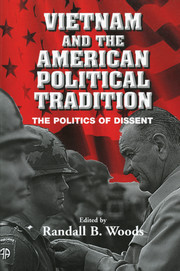Book contents
- Frontmatter
- Contents
- List of Contributors
- Introduction
- Anti-Imperialism in U.S. Foreign Relations
- World War II, Congress, and the Roots of Postwar American Foreign Policy
- The Progressive Dissent: Ernest Gruening and Vietnam
- “Come Home, America”: The Story of George McGovern
- Congress Must Draw the Line: Senator Frank Church and the Opposition to the Vietnam War and the Imperial Presidency
- Dixie's Dove: J. William Fulbright, the Vietnam War, and the American South
- Advice and Dissent: Mike Mansfield and the Vietnam War
- The Reluctant “Volunteer”: The Origins of Senator Albert A. Gore's Opposition to the Vietnam War
- A Delicate Balance: John Sherman Cooper and the Republican Opposition to the Vietnam War
- Friendly Fire: Lyndon Johnson and the Challenge to Containment
- Richard Nixon, Congress, and the War in Vietnam, 1969–1974
- Index
Richard Nixon, Congress, and the War in Vietnam, 1969–1974
Published online by Cambridge University Press: 21 November 2009
- Frontmatter
- Contents
- List of Contributors
- Introduction
- Anti-Imperialism in U.S. Foreign Relations
- World War II, Congress, and the Roots of Postwar American Foreign Policy
- The Progressive Dissent: Ernest Gruening and Vietnam
- “Come Home, America”: The Story of George McGovern
- Congress Must Draw the Line: Senator Frank Church and the Opposition to the Vietnam War and the Imperial Presidency
- Dixie's Dove: J. William Fulbright, the Vietnam War, and the American South
- Advice and Dissent: Mike Mansfield and the Vietnam War
- The Reluctant “Volunteer”: The Origins of Senator Albert A. Gore's Opposition to the Vietnam War
- A Delicate Balance: John Sherman Cooper and the Republican Opposition to the Vietnam War
- Friendly Fire: Lyndon Johnson and the Challenge to Containment
- Richard Nixon, Congress, and the War in Vietnam, 1969–1974
- Index
Summary
Domestic divisions over the war in Vietnam helped Richard M. Nixon win the presidency in 1968. Paradoxically, continuing discord over the course of American policy in Vietnam contributed to Nixon's disgrace and downfall in 1974. During the five and a half years of his presidency, Nixon ignored, abused, and fought with members of the Democratic-controlled Congress on a variety of domestic and international issues. The competition was especially intense on the subject of Vietnam, and it deepened as time went on. Nixon and Henry Kissinger, his national security adviser (and, from September 1973, his Secretary of State) enjoyed wide congressional support for their policy of détente with the Soviet Union and opening relations with the People's Republic of China.
But Congressional endorsement of Nixon's conduct of U.S. foreign relations did not extend to the war in Vietnam. Nixon's policy toward the world other than Vietnam seemed fresh and forward looking in 1969. His efforts in Vietnam, however, appeared to many in the general public and in Congress a continuation of the past. In 1969, most Americans were eager for the war to end. Nixon enjoyed a year-long “honeymoon” on Vietnam, but the U.S. expansion of the war in Cambodia in April, 1970, ignited some of the loudest protests of the war. After Cambodia, more and more members of both houses came to distrust Nixon deeply. They made their displeasure known by introducing and sometimes passing a variety of resolutions and laws limiting the president's authority to carry on the war.
- Type
- Chapter
- Information
- Vietnam and the American Political TraditionThe Politics of Dissent, pp. 282 - 300Publisher: Cambridge University PressPrint publication year: 2003
- 1
- Cited by

